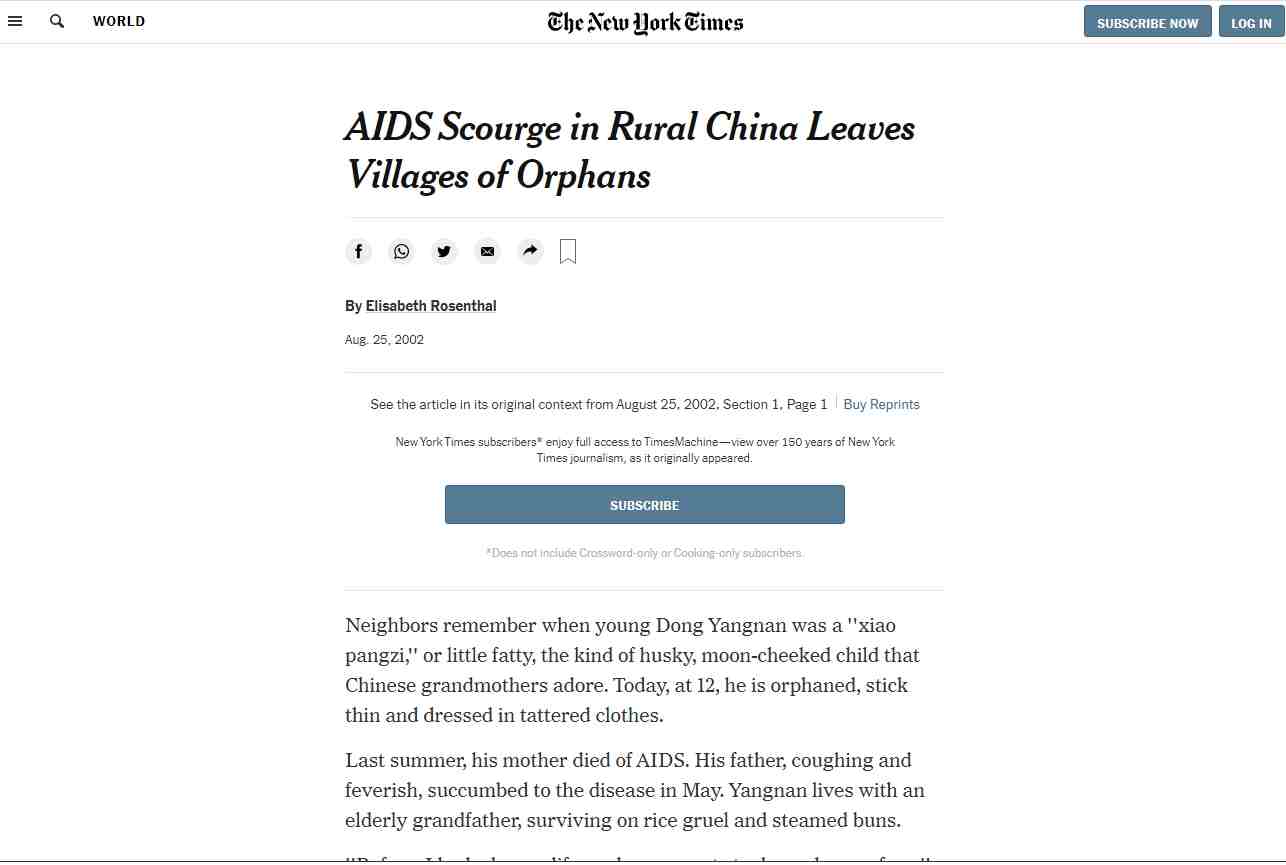AIDS Scourge in Rural China Leaves Villages of Orphans
(2002/08/25 The New York Times, Section 1, Page 1 )

Source: https://www.nytimes.com/2002/08/25/world/aids-scourge-in-rural-china-leaves-villages-of-orphans.html
DONGHU, China – Neighbors remember when young Dong Yangnan was a “xiao pangzi,” or little fatty, the kind of husky, moon-cheeked child that Chinese grandmothers adore. Today, at 12, he is orphaned, stick thin and dressed in tattered clothes.
Last summer, his mother died of AIDS. His father, coughing and feverish, succumbed to the disease in May. Yangnan lives with an elderly grandfather, surviving on rich gruel and steamed buns.
“Before, I had a happy life, and my parents took good care of me,” he said listlessly, his big eyes staring away to a lost past. “Now I have to look after myself and often have no money.”
AIDS is creating an explosion of destitute orphans here in China’s rural heartland and is driving large numbers of families into such dire poverty that they can no longer afford to feed or clothe, much less educate, their children.
At the start of last year, there were no orphans in this village in southern Henan Province. Today, because of AIDS, there are nearly 20, and hundreds more are likely to face a similar fate within a year or two. Residents estimate that 200 of the village’s 600 families have one parent dead and the other ill, often too frail to work or even rise from bed. They receive little government help.
According to unpublished statistics from the United Nations Development Program, the number of families living below the official poverty line in Xincai, the county that includes Donghu, skyrocketed last year, to 270,000 from 40,000. Breadwinners fell ill, and families spent whatever they could scrape together for food and care.
Experts say the blow dealt by AIDS to villages like Donghu has been sharper and crueler than anywhere else in the world because of the unusual and efficient way the disease spread here.
Nearly the entire adult population of some villages was infected almost simultaneously in the 1990’s as poor farmers flocked en masse to blood collection stations whose unsterile practices introduced hefty doses of H.I.V., the virus that causes AIDS, directly into their veins. Now, the victims — including many married couples — are falling ill and dying almost in unison.
In other countries suffering epidemics, grandparents or aunts and uncles have helped the sick or taken in children. But here those relatives are often themselves overwhelmed by AIDS. Also, because China’s family planning policies have limited families to one or two children, there is rarely an older sibling to serve as a surrogate parent.
Ren Genqing, 16, dropped out of school three years ago because the money that would have gone for his school fees was needed to buy medicine for his parents. His father died of AIDS in 2000, his mother in 2001. One uncle has died of AIDS, and another is sick. He alone is responsible for his 12-year-old brother.
“I’m growing up, but my brother is still young,” he said, a slightly cocky teenager, old before his time. “Before, the children here used to play soccer and other games, but you rarely see that these days. Lots of people are dying, and nobody’s in the mood for that sort of thing.”
Some Chinese experts estimate that selling blood was common in dozens of Henan Province’s counties before it was banned in the mid-90’s, leaving at least a million people infected with H.I.V. In some places, selling blood served as a source of emergency income — fast cash to fix a roof or pay off a debt — but in others, like Donghu, most adults sold blood at least occasionally, and many sold it every week.
Like many of the most severely affected villages, Donghu was near a blood collection station, one with government ties. Commercials on local television assured villagers that selling their blood was safe.
Villagers here estimate that more than half of adults in Donghu were infected with H.I.V. in the early 1990’s. A decade later, the death rate is gathering steam, with several people dying each week. The effects are largely hidden since local officials monitor access to the village and have warned residents not to speak with reporters.
“The situation is worsening very rapidly because, once a spouse dies, the burden on the remaining one escalates and, of course, they are all infected too,” one villager said.
Extreme poverty has quickly and predictably followed, as able-bodied adults can no longer work and families sell their possessions to pay for basic needs. They borrow to buy medicine for suffering loved ones, but the simple remedies they can afford are ineffective against AIDS.
Compounding the financial woes, grain, fruit and vegetables grown in these villages are almost impossible to sell in nearby cities, whose residents are afraid of contagion.
“It really brings you to tears,” said a medical worker who has visited villages in the province. “You see these pretty decent houses, built with the money from selling blood, but inside there is nothing. They’ve sold the farm tools, the animals, even the furniture. People who are dying are lying on the floor.”
For families like Ren Dahua’s, it has been a vicious cycle: poverty begat AIDS, but AIDS has begotten previously unimaginable poverty.
Mr. Ren started selling blood to patch his mud and brick hut, to keep his children dry when it rained. He also used the money to repay debts incurred from the purchase of an ox, fertilizer and wheat seed.
When the blood station opened in 1992, he and his wife rushed to sell their blood, for about $5 a bag. He regarded it as an opportunity and sold blood more than 30 times.
When two more blood stations opened nearby — one affiliated with the local Red Cross and another run out of a hospital less than 100 yards form his front door — he sometimes visited daily.
At the time, blood from several farmers was pooled and centrifuged to skim off the plasma, which the blood stations sold to companies to make medicines. The remaining red cells were pooled and transfused back into the sellers, providing a gruesomely efficient method for transmitting blood-borne disease, including hepatitis and AIDS.
By 1993, both Mr. Ren and his wife, Diao Yuhuan, were disqualified from selling blood because they had obvious symptoms of hepatitis C: jaundice, swollen waists and almost constant nausea. They did not know that they had also contracted H.I.V., which often takes years to show symptoms.
Last year, Ms. Diao fell ill with tuberculosis, an infection that is often severe in people who have H.I.V. Selling his possessions, Mr. Ren scraped together 3,500 yuan, which covered a brief — but useless — hospital stay in Beijing. His wife died at home in January.
“Because I spent so much money when my wife was ill, my children cannot go to school,” said Mr. Ren, who also has H.I.V. “My son passed the high school entrance exam, but there’s no money for him to go.”
In some families, like that of Wei Zhanjun, two generations of adults are dead or dying, leaving a single child carrying an unimaginable burden. Mr. Wei, whose wife died of AIDS in 2000, is so short of breath he can barely walk. His body is covered with painful sores. His parents, in their 50’s, are bedridden with similar symptoms. Only his 8-year-old son, Wei Zhicheng, is healthy.
“He is good boy, but ever since my wife fell ill, there has been no money in this home and not enough food,” he wrote in a letter describing his plight. “Now, nobody farms our family’s land, and we have heavy debts that we cannot repay.” Money donated by neighbors to pay his son’s school fees was quickly diverted to buy painkillers.
There is really nowhere most families can turn for help. Most people die in horrible pain with little care. Their children leave school and go hungry. Although a few villages have been given simple medicine and a bit of financial aid, some by private groups and some by the government, overwhelmed health officials have been slow to react.
In some villages, dozens of children have dropped out of school because their families can no longer afford the fees, and proposals to offer such children discounts have proved ineffective. Some children from homes where a family member has H.I.V. say they have been barred from school. Others say the discounts are often so small, about 20 percent, that school remains unaffordable.
Wang Beibei, 10, a star pupil from Suixian, a county in northern Henan, was expelled from third grad last year after school officials discovered that her father had died of AIDS.
“They were afraid to let me in, and my friends stopped playing with me,” she said by phone, from the home of a sympathetic neighbor. About a third of the families in her village had sold blood — fewer than in Donghu — in large part because the village was farther from blood stations.
In June, Beibei’s mother died of AIDS. School is out of the question. There is no one to work the family’s land, and she and here brother struggle just to look out for each other. “My brother cooks for me, and we eat noodles,” she said. “We have no money for eggs or meat.”
In Donghu, the school still admits such children if they can pay but offers no significant tuition breaks. Likewise, though government plans have called for families unable to farm because of AIDS to be exempt from grain taxes, families here and elsewhere say they are still required to pay in full.
“The government doesn’t do anything for me, and likewise it didn’t do anything for my family,” said Gao Li, 15, an orphan from Donghu, with cropped hair and a quiet, matter-of-fact voice.
“I’m responsible for my brother, who is 10,” she said. “Nobody among my relatives can help. My dad had brothers but one is dead, and the others are sick, too. My biggest difficulty is, I have no future.”
Indeed with so much death and so little reason to hope, many poor farmers with AIDS have shifted their focus from securing treatment for themselves to ensuring a future for their children.
Since late last year, Xie Yan, who is in her late 30’s and is H.I.V. positive, has had an obsession: She wants to find someone to adopt her 4-year-old son, who is not infected, as well as someone to support her two daughters, 13 and 9. Her husband dies of AIDS last year, and last winter she watched her best friend bleed to death on a hospital’s doorstep while the friend’s 4-year-old watched in terror.
“I try not to think abut myself since I know I won’t be cured,” she said. “But at night I can’t sleep — I have nightmares and wild thoughts — worrying about what will happen to the kids.”
Elisabeth Rosenthal
This post is also available in: Chinese (Traditional) Chinese (Simplified)



